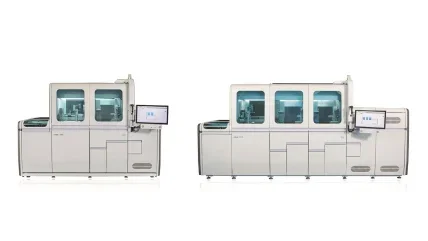
Swiss health technology company Roche has introduced the cobas Respiratory flex test, which uses the company’s novel Temperature-Activated Generation of Signal (TAGS) technology.
TAGS technology uses multiplex polymerase chain reaction (PCR) testing, combined with colour, temperature, and data processing, to identify 15 pathogens in a single PCR test.
The cobas Respiratory flex test runs on the cobas 5800, 6800 and 8800 systems to detect up to 12 most common respiratory viruses within a patient sample.
It can detect Influenza A & B, Respiratory Syncytial Virus (RSV), Adenovirus (AdV), human Metapneumovirus (hMPV), Enterovirus/Rhinovirus (EV/RV), Parainfluenza 1, 2, 3 & 4, Coronavirus, and SARS-CoV-2.
Roche Diagnostics CEO Matt Sause said: “As respiratory outbreaks, combined with growing incidence of antibiotic resistance continue, getting an accurate and timely diagnosis is critical to providing the best care for patients and curbing transmission.
“Using TAGS technology, the cobas Respiratory flex test can help clinicians identify specific respiratory viruses sooner, helping to speed up diagnosis and get the right care to patients.”
According to Roche, traditional PCR tests can identify up to four results in a single test, and its TAGS technology can address the technical limitation using a novel approach.
It allows labs to immediately deliver fast, accurate, high throughput flexible syndromic multiplex PCR testing without needing to upgrade their existing cobas 5800, 6800 and 8800 systems.
The test also allows clinicians to specify which pathogens to look for using pre-selected targets, and to factor in the test setting, season, locality and patient-specific factors, said Roche.
The cobas Respiratory flex test avoids the need for multiple test kits, which simplifies laboratory logistics, helps optimise the use of resources and reduces pressure on labs.
Furthermore, its TAGS technology has potential applications across multiple pathogen types and indications and can transform high throughput testing in future, said the health technology company.






